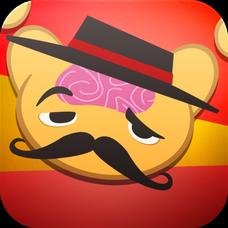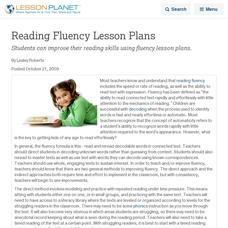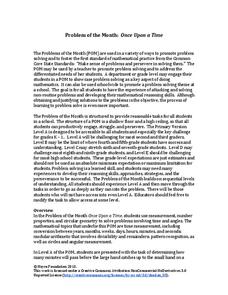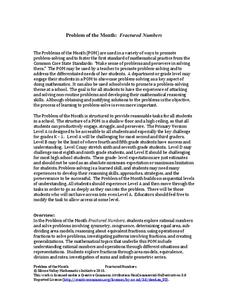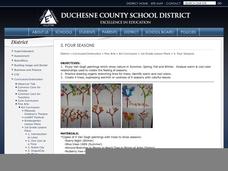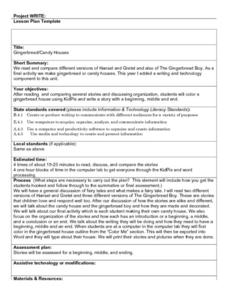Mind Snacks
Learn Spanish - MindSnacks
Cómo se dice 'fun' en Español? After playing a few of these engaging, vocabulary-centered games, your young language learners will be able to tell you! This is sure to become a favorite app in any Spanish class.
Mind Snacks
Learn French - MindSnacks
Bien sûr this is a great app! Your French language learners will want to snatch up a tablet and practice their vocabulary all the time. With nine entertaining games, the app will teach pupils necessary vocabulary and phrases in a...
Curated OER
Reading Fluency Lesson Plans
Learn the basics behind teaching reading fluency. With descriptions of both direct and indirect fluency instruction and practice, this article also includes a few lessons teachers can put to use in their classroom today.
Pyro Innovations
Get into Shape
Shapes are so fun! Little ones explore, identify, and create shapes using tangrams or pattern blocks. The activity is intended to stimulate critical thinking while engaging learners through play and shape identification. Each child will...
Curated OER
Postcards For Your Ears
Here is a great way to have your learners make audio postcards to share by recording a message on the computer. They write and revise an appropriate message about an object from home, choose a background, and font colors for the...
Smithsonian Institution
Our Story: Duke Ellington and Jazz
Get parents or guardians into the swing of things with a jazzy homework assignment. A detailed six-page guide provides before, during, and after reading suggestions for Duke Ellington: The Piano Prince and His Orchestra, Andrea Davis...
Curated OER
Oh, What A Day
Students listen as the teacher reads A Country Far Away. They predict what they will do and what they think their partner student will be doing. Students create a KWL chart for Japan. They collect information about their activities on an...
Curated OER
Living-Nonliving
Young scholars determine that environments have living and nonliving parts. They discuss what makes something a living thing and something a nonliving thing. They make a chart and list characteristics of living things and nonliving things.
Curated OER
Role Models
First graders identify heroes by researching their family history. In this personal heritage lesson, 1st graders define the term "hero" and the characteristics that represent it. Students research family resources and family trees in...
Curated OER
Save the Earth Day
First graders tellacollaborate with other students around the world sharing their ideas about what earth day means to them. They share ways in which they recycle, reduce and reuse.
Curated OER
Recycling and Composting
Students set up composting sites that allow food scraps and paper to be recycled by nature. They are introduced to one aspect of recycling; composting. Students see how God recycles as the worms change garbage into something that brings...
Curated OER
Exploring the Sky: Reading Maria's Comet
Discover the science behind astronomy. After reading the book Maria's Comet, which is about a young woman who breaks new ground by becoming a female astronomer, young learners practice reading comprehension with...
Noyce Foundation
Once Upon a Time
Examine the relationship between time and geometry. A series of five lessons provides a grade-appropriate problem from elementary through high school. Each problem asks learners to compare the movement of the hands on a clock to an angle...
Noyce Foundation
Surrounded and Covered
What effect does changing the perimeter have on the area of a figure? The five problems in the resource explore this question at various grade levels. Elementary problems focus on the perimeter of rectangles and irregular figures with...
Noyce Foundation
Perfect Pair
What makes number pairs perfect? The resource provides five problems regarding perfect pairs of numbers, the definition of which changes in complexity with each task. Solutions require pupils to apply number sense and operations, as well...
Noyce Foundation
Cubism
If cubism were a religion, would you follow it? Lower-level tasks focus primarily on counting the number cubes in a structure and relating the number to surface area. As learners progress to higher-level tasks, isometric drawings and...
Noyce Foundation
Piece it Together
Score some problems all related to soccer balls. The first few problems focus on pattern blocks to see relationships between figures. More advanced problems focus on actual soccer balls, the patterns on the balls, and their volumes and...
Noyce Foundation
Double Down
Double the dog ears, double the fun. Five problems provide increasing challenges with non-linear growth. Topics include dog ears, family trees and population data, and geometric patterns.
Noyce Foundation
Fractured Numbers
Don't use use a fraction of the resource — use it all! Scholars attempt a set of five problem-of-the-month challenges on fractions. Levels A and B focus on creating fractions and equivalent fractions, while Levels C, D, and E touch on...
Curated OER
Four Seasons
First graders examine and describe the characteristics of the four seasons. Using a computer, they write one sentence about each of the four seasons and draws an illustration to accompany it. They present each drawing and sentence to the...
Curated OER
Graphing Our Favorite Candy Bars
Students use ClarisWorks to graph class' favorite candy bars on a bar graph.
Curated OER
1st Grade - Act. 07: Seven Fat Cats
First graders listen to story Seven Fat Cats and match the sounds (rhyming, beginning, ending, and vowel).
Curated OER
Small Group Counseling
Students are introduced to the concept of self-esteem and discuss how it is important in friendships. In groups, they counsel one another to determine how one's personal behavior affects the others in their group. They discover the...
Curated OER
Gingerbread/Candy Houses
Students compare and contrast different versions of "Hansel and Gretel" and "The Gingerbread Boy". Using a software program, they color a gingerbread house design of their choice. Based on the house, they write thier own story making...


